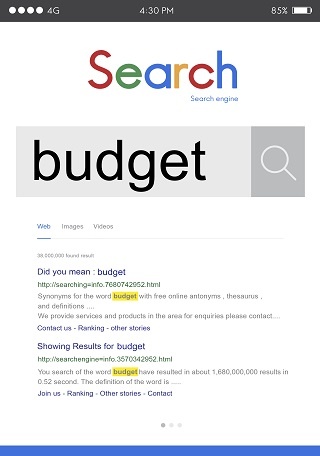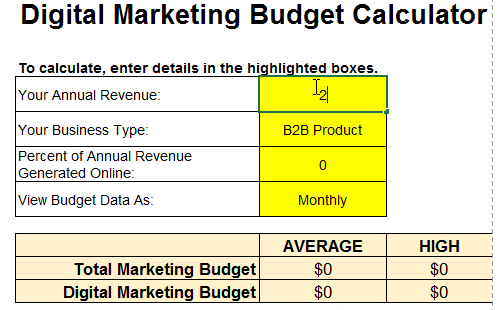How to Develop the Best SEO Marketing Budget

It depends, of course. If you’re just now, in 2017, starting to think about SEO for the first time, this probably isn’t the right blog for you. Check out this Beginner’s Guide to SEO from Moz.
For those trying to figure out how much to spend on SEO, you’re in the right place. When it comes to SEO spending and budgeting, be sure to have an ultimate goal in mind and a desired return on that investment (ROI) right from the start.
Calculate Overall Digital Marketing Budget First
Your first step should be to determine how much you want to spend on your overall digital marketing efforts (this digital marketing calculator can help with that). Next, you’ll want to figure out what percentage of that budget should be devoted to the SEO portion of your marketing.
Here’s a video discussion about SEO Budgets from two of our fearless leaders (Chris Leone & Phil Woods):
- Is your business focused on selling to consumers (B2C), businesses (B2B), or both?
- Are you selling a product, service or both?
- Is your website an ecommerce site, or is the goal to get leads?
- How long has your company had an online presence?
- How much organic search traffic do you get now?
- Are you on the first page of Google for any search terms?
- If yes to the above, what got you there? A blog, a video, a quiz, a tool?
- How much competition is there for keywords in your industry?
- What do you think your competitors are spending on their SEO efforts?
Newer businesses need to spend a lot more on the content creation side of SEO as they ramp up their online presence. Older businesses may be doing great in search rankings and have lots of online content, but their websites could have technical problems that are holding them back from getting into those top positions.
Lost images, broken links, unresponsive site design, and other technical issues can cause serious SEO problems. Companies dealing with such issues should devote more of their budget to technical SEO improvements, page optimization, and user experience, all of which are factors that weigh in on your search rankings.
How Much Should I Pay Someone for SEO Work?
It's possible to hire an in-house SEO specialist; however, they're not easy to find and most businesses won't have enough work to keep them busy all year round. Another option is to outsource the work directly to an SEO specialist. Independent SEO consultants typically charge between $80 - $190 per hour, based on experience.
 We'd only recommend going with an independent SEO consultant if you have marketing professionals on staff that are managing long term SEO strategies and tracking the results yourself. If those in-house marketing resources aren't available, you might want to consider hiring a digital marketing agency enter shameless plug here to handle ongoing SEO implementation, strategy, and results tracking.
We'd only recommend going with an independent SEO consultant if you have marketing professionals on staff that are managing long term SEO strategies and tracking the results yourself. If those in-house marketing resources aren't available, you might want to consider hiring a digital marketing agency enter shameless plug here to handle ongoing SEO implementation, strategy, and results tracking.
How Much Will It Cost to Hire a Digital Marketing Agency for SEO?
It makes sense to hire an agency for SEO, because the work is so specialized. Many digitally focused marketing firms have working knowledge of SEO strategy, SEO best practices, and could help you accomplish your 2017 SEO goals. If you hire an agency for SEO, expect to pay somewhere between $100 - $185 per hour, depending on the agency's billable rate.
If you lump content marketing into what you consider SEO spending, it can make up as much as 50% or more of a digital marketing budget. The more time you devote to SEO and content creation, the faster you should be able to expect results.
Depending on what you can afford, the size of your website, and the amount of content you're generating, you might expect to devote anywhere between 5 and 50 hours per month to your SEO efforts. Based on the going rates of most digital marketing agencies, this could cost anywhere between $500 and $10,000 per month.
Balancing the SEO Budget with Other Digital Marketing Efforts
What other digital marketing strategies are you trying? SEO isn’t the only thing you should be doing. Social media, email marketing, paid search marketing, display ads, remarketing campaigns, affiliate marketing, influencer marketing, and many others are likely to be part of your overall digital marketing strategy.
Remember, unless you have the resources, time and manpower, you can’t do it all. If content marketing is part of your SEO strategy, keep in mind that the creation of this content takes time and money and will likely take up a large chunk of your SEO budget. Even if you outsource content creation, managing that process and the strategy behind that process takes time.
Watch our recent discussion on the topic of SEO budgets
Topics include:-
How much you'll pay to hire an internal SEO specialist
-
How much you should pay to outsource SEO
-
The top factors that will impact your overall SEO investment & return
-
Red flags to look for when vetting an SEO specialist or SEO company
Setting the Groundwork for SEO Success
What does SEO success look like to your business? What do you hope to achieve from optimizing your website for search rankings? We recommend establishing clearly defined goals and putting those SEO goals in writing.
Here’s a simple Google Analytics graph that shows one of our clients' slow and steady organic search progress over the last two years. They're seeing approximately 5X the organic traffic from when we started.
Once you get started and have developed a process for tracking the results of your progress, it’s vital to circle back to your original goals and make sure you’re hitting desired, preset benchmarks. While it’s likely you’ll achieve some quick wins along the way, long-term SEO success takes time. Start thinking in terms of months, not days.
Why Does an SEO Budget Matter?
If you invest thousands of dollars towards generating content and optimizing pages on your website to rank for specific keywords, you better be sure those keywords are worth the investment and that the traffic generated can be converted into leads or sales for your business.
 Otherwise, you’re either not going after the right keywords or you’re doing something else wrong. You may never recoup that investment. It’s also possible to spend money trying to rank for a term that is virtually unachievable. Sorry, if you’re trying to rank for a product you sell, like a “Sony TV,” you’re never going to get to the #1 spot, and its going to take a lot of effort getting on the coveted first page of Google search, even it’s just for your town or city.
Otherwise, you’re either not going after the right keywords or you’re doing something else wrong. You may never recoup that investment. It’s also possible to spend money trying to rank for a term that is virtually unachievable. Sorry, if you’re trying to rank for a product you sell, like a “Sony TV,” you’re never going to get to the #1 spot, and its going to take a lot of effort getting on the coveted first page of Google search, even it’s just for your town or city.
Right now, there could be revenue generating keywords that are just within your grasp and much easier to achieve. We call these the low hanging fruit. Having a specific budget in mind helps your marketing team prioritize which keywords to go after first, second, and third. Start with the easy wins and work up to the more challenging terms as you progress.
Most businesses have limited time and money to invest in Google search rankings. Before even thinking about how much to spend on SEO, it’s a good idea to determine what search rankings and organic traffic mean to the success of your business.
How to Effectively Spend Your New SEO Budget
You’ve established a set amount of money to spend on your SEO budget each month, now what? One place to start is by looking at past online sales and leads. Figure out how many of those leads came from organic search efforts. Out of these organic searches, start reviewing the actual keywords that brought these individuals to your website.
With a few simple calculations, you should be able to assign specific values to organic search traffic and keyword rankings. Another approach is to use online tools to figure out how much people are willing to spend on specific keywords.
Going through this process can help you figure out how much specific keyword rankings are actually worth to your business, non-profit, or other entity.
So Why Is SEO So Important?
You might have already created the best, most comprehensive, piece of content on the internet for a particular topic. But, if that content doesn’t thoughtfully utilize the terminology which people are actually using, it may never be found.
Welcome to the Interactive Portion of this Article!
 You’ve just launched a shop that sells artificial flowers. When you’re creating online content for this flower business, “artificial” is the only term you use, because you know calling them “fake” plants or “fake” flowers is technically incorrect, according to some.
You’ve just launched a shop that sells artificial flowers. When you’re creating online content for this flower business, “artificial” is the only term you use, because you know calling them “fake” plants or “fake” flowers is technically incorrect, according to some.
But your goal of being in business is to sell a product, right? Not to take a moral stand over grammar issues.
Now, as a real-life test, go into Google Trends, and enter the following five terms.
- Artificial Flower
- Fake Flower
- Pretend Flower
- Silk Flower
- Faux Flower
Were you able to glean some interesting information that could be applied to SEO and keyword strategies? Now, let’s set up an imaginary SEO budget that only focuses on these 5 keywords. You have $500 to spend per month on creating content and optimizing your website’s SEO for these five terms, how would you spend it?
Something to keep in mind with this simplified example is that Google’s algorithms take synonyms like these into consideration. If Google considers any of these terms a synonym, you may have success without having to fuss over terminology, but don’t count on that.
Tracking the Results of SEO Work
If you don’t have the ability to track the results of SEO efforts, how will you know if what you’re doing is actually working?
 Getting set up on Google Tag Manager and Google Analytics can help make measuring the success of your SEO efforts easier. It also helps to have a technical expert, like John Keller, who can guide you through the technical facets of tracking online results.
Getting set up on Google Tag Manager and Google Analytics can help make measuring the success of your SEO efforts easier. It also helps to have a technical expert, like John Keller, who can guide you through the technical facets of tracking online results.
Combining Common Sense & Data Makes for the Best SEO Strategies
To some degree, you have to do some guess work and assuming with your overall SEO strategies, especially in the beginning. What are people searching that would indicate an interest in my business, product, or service?
But, as your SEO results progress and you climb the ladder of Google’s search rankings, you must put aside some of these assumptions and pay close attention to the actual data.
The Key to SEO Success
In reality, there’s no ONE thing that can guarantee success when it comes to moving up in Google search rankings. Just as with any good digital marketing strategy, it’s best to try a few different techniques, track the results, and make adjustments based on those results.
Keep tabs on what your competitors are doing and pay attention to the websites that hold the top-ranking spots for your target keywords.  to learn more about developing an SEO strategy for your business or download our interactive budgeting calculator to figure out how much you should be spending on Digital Marketing.
to learn more about developing an SEO strategy for your business or download our interactive budgeting calculator to figure out how much you should be spending on Digital Marketing.






Agree, disagree, or just have something to add?
Leave a comment below.